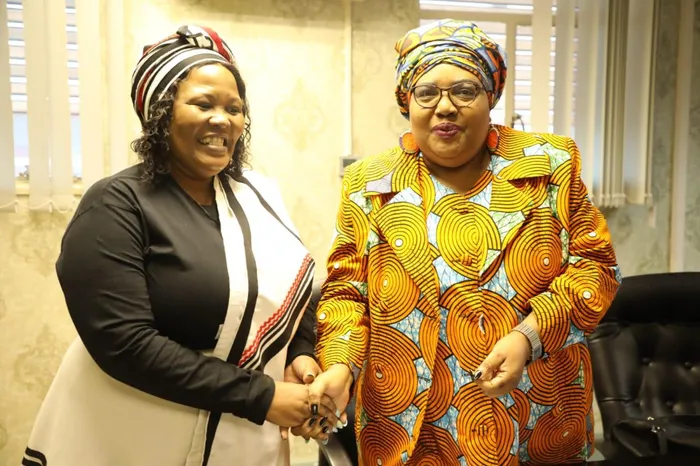CRL Commission raises concerns about child protection gaps in religious settings and cultural practices

KZN Social Development MEC Mbali Shinga (left) and RCL chairperson Thoko Mkwanazi-Xaluva discussed the growing concern around gender-based violence, religious exploitation, and lack of accountability in certain faith-based institutions during their recent meeting.
Image: Supplied
The Commission for the Promotion and Protection of the Rights of Cultural, Religious and Linguistic Communities (CRL) has raised specific concerns about child protection gaps in religious settings and cultural practices, such as virginity testing.
CRL chairperson Thoko Mkhwanazi-Xaluva met KwaZulu-Natal Social Development MEC Mbali Shinga in Pietermaritzburg last week ahead of Child Protection Week, which runs from May 29 to June 5.
In the meeting between Mkhwanazi-Xaluva and Shinga, Mkhwanazi-Xaluva raised specific concerns about child protection gaps in religious settings and cultural practices, such as virginity testing. She said unlike schools, where staff are thoroughly vetted and screened, many religious spaces lack such safeguards, thus leaving children vulnerable.
Mkhwanazi-Xaluva said her commission’s constitutional mandate is to protect and promote the rights of cultural, religious, and linguistic communities while strengthening democracy and called on the provincial government to work together to ensure that children are protected from abuse and exploitation in all environments.
“Legislation clearly states that virginity testing may only be conducted on girls over the age of 16 who have provided informed consent. Test results must remain confidential, and marking girls on their foreheads is illegal," said Mkhwanazi-Xaluva.
Shinga also acknowledged the growing concern around gender-based violence, religious exploitation, and lack of accountability in certain faith-based institutions. She noted that partnerships such as these are essential for crafting effective, long-term strategies to protect vulnerable communities.
“We remain steadfast in our commitment to upholding the rights of children and promoting their safety, as enshrined in our Constitution,” she said.
Dr Nomagugu Ngobese, the founder of Nombukhubulwane Institute, a cultural body advocating for the preservation of African cultural practice, said the practice of virginity testing has helped to reduce sexual violence against children as the organisation conducts tests randomly.
The commission’s visit to the province came at a time when mass virginity testing is set to start in preparation for the annual Reed Dance ceremony, which is presided over by Zulu King Misizulu kaZwelithini. All maidens who attend the ceremony have to be tested before they are allowed to present their reeds to the king.
*This story has been updated to reflect that CRL chairperson Thoko Mkhwanazi-Xaluva did not issue a new directive for virginity testing for girls under the age of 16 but was making reference to the Children’s Act No. 38 of 2005. In fact, the Act was passed by Parliament and the Department of Social Development, and not the CRL, is responsible for monitoring its implementation.
*The error is regretted and we apologise unreservedly for any inconvenience caused.
